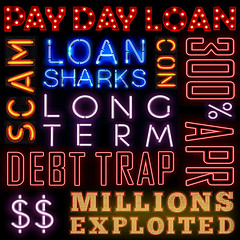 On June 2nd, the Consumer Financial Protection Bureau (CFPB) proposed new rules to better regulate payday, title, and other short-term loans. The industry is responsible for predatory practices that trap low-income families into a cycle of debt that costs our most vulnerable communities $8.7 billion each year. Payday lenders claim they help working families by providing easy access to cash when workers face an economic crisis, but the reality is 75% of the industry’s fees–and profits–come from borrowers who had to take out more than 10 loans in a 12 month period.
On June 2nd, the Consumer Financial Protection Bureau (CFPB) proposed new rules to better regulate payday, title, and other short-term loans. The industry is responsible for predatory practices that trap low-income families into a cycle of debt that costs our most vulnerable communities $8.7 billion each year. Payday lenders claim they help working families by providing easy access to cash when workers face an economic crisis, but the reality is 75% of the industry’s fees–and profits–come from borrowers who had to take out more than 10 loans in a 12 month period.
In the words of one payday lending CEO,
“You’ve got to get that customer in, work to turn him into a repetitive customer, long-term customer, because that’s really where the profitability is.”
It’s these unethical, but legal practices that drain $23,951,459 out of the pockets of hard-working people every single day.
The facts are in on payday lenders:
-
Payday loans average 300% APR or higher with online loans averaging over 650% APR
-
94% of all borrowers take out another loan within a month and more than half take out a new loan the SAME DAY their old loan was due
-
1 in 6 borrowers lose their car on top of paying steep interest and fees on car title loans
-
50% of borrowers accrued bank penalties averaging $185 from repeated unsuccessful withdrawal attempts by lenders
-
The average payday loan customer spends two-thirds of the indebted to the lender and 22% remain in debt for an entire year
-
Lenders routinely using harassment, threats, and illegal practices to bully people into taking out more loans and continuing the cycle of debt
For the first time in history, Congress has given a federal agency the authority to uniformly regulate small-dollar consumer loans including the payday, installment, and related loan industries that strip billions in wealth from our communities and trap our families and neighbors in endless debt.
The new rules would:
-
Require lenders to determine whether borrowers can afford to repay their loan while still being able to afford basic necessities including food and rent
-
Restrict lenders’ ability to push distressed borrowers into taking out additional loans
-
Allow a lender to provide low-risk short-term loans of up to $500 that are structured to prevent borrowers from becoming trapped in debt
-
Allow for longer-term loans that cap interest rates at 28% and incentivize lenders to keep default rates at 5% or less
-
Limit a lender’s ability to make repeated withdrawal attempts from borrowers’ bank accounts and require them to provide written notice before doing so
The CFPB is accepting public comment through September 14th and needs to hear from you.

